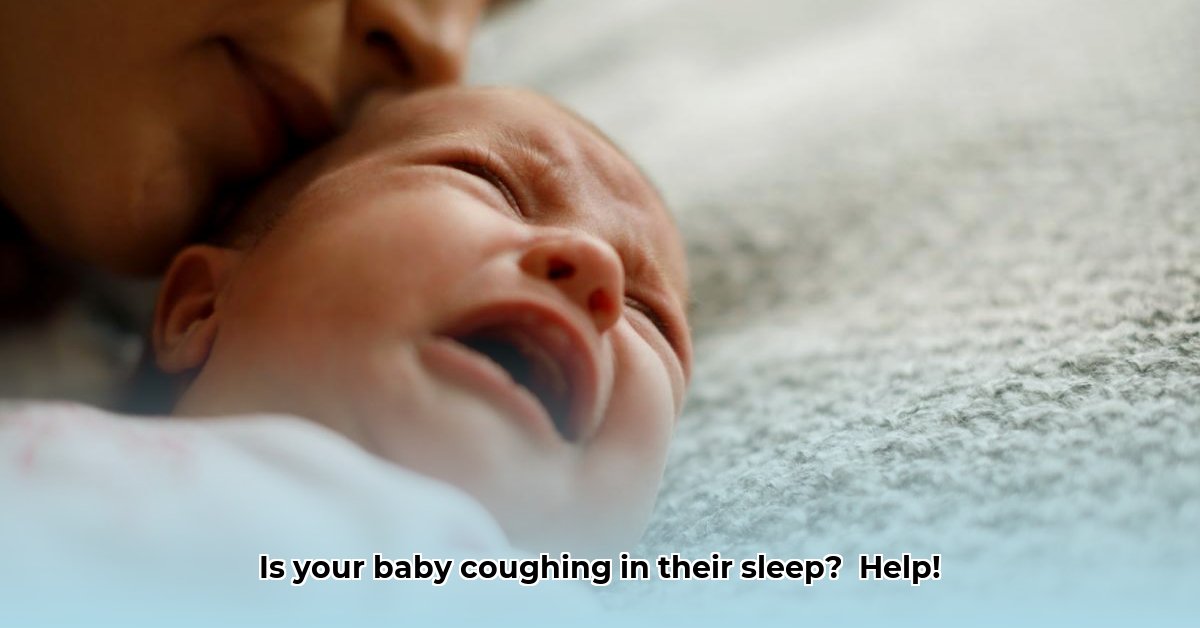
Understanding and Soothing Your Little One's Nighttime Cough
Is your baby's cough keeping you up at night? It's a common worry for parents, and it's completely understandable to feel concerned. This guide will help you understand why your little one might be coughing so much at night and what you can do to help. We'll explore common causes, when to seek immediate medical attention, and practical home care strategies to help both your baby and you get some much-needed sleep.
Common Causes of Nighttime Coughs
A nighttime cough in babies often stems from several common factors. Think of it like this: a baby's delicate airways are more sensitive at night, making them more susceptible to irritation. Here are some frequent causes:
Viral Infections: These are the most common culprit. Think common colds and flu. Viral infections often inflame the airways, leading to coughing, especially when lying down. The cough usually subsides as the infection clears.
Croup (also known as laryngotracheobronchitis): This viral infection causes a characteristic "barking" or seal-like cough, often worse at night. The dryness of night air can exacerbate the cough. While it sounds alarming, it typically resolves within a few days.
Bronchiolitis: This viral infection affects the smallest airways in your baby's lungs. You may notice wheezing alongside the cough.
Pertussis (Whooping Cough): This highly contagious bacterial infection is particularly dangerous for babies, but is entirely preventable with vaccination. It's characterized by a distinctive "whooping" sound after coughing fits.
Allergies: Environmental irritants like dust mites, pollen, or pet dander can trigger coughs, particularly at night due to prolonged exposure.
When to Seek Immediate Medical Attention: Red Flags
While many coughs are relatively harmless, some require urgent medical attention. Pay close attention, especially if your baby is under three months old, to these warning signs:
High Fever (Above 39°C): A high fever often indicates a serious infection requiring professional assessment.
Breathing Difficulties: Rapid breathing, flared nostrils, or drawing in of the skin between the ribs (retractions) during breathing are signs of respiratory distress and need immediate medical attention.
Bluish Skin (Cyanosis): This serious sign indicates a lack of oxygen and requires emergency medical care.
Persistent Cough (Over Three Weeks): A cough lasting more than three weeks warrants a doctor's visit to investigate the underlying cause.
Babies Under Three Months: Always seek medical advice for any cough in an infant under three months old.
Home Care Strategies: Soothing Your Baby's Cough
While prompt medical attention is crucial when necessary, several home care strategies can help soothe your baby's cough:
Hydration: Provide plenty of fluids, like breast milk, formula, or water. This helps thin mucus and ease coughing.
Humidification: A cool-mist humidifier adds moisture to the air, making breathing easier and less irritating.
Rest: Ensure your baby gets ample rest, as it aids recovery from infection.
Positioning: Elevating the head of your baby's cot slightly (using a small incline) can help drain mucus. Avoid using pillows, which pose a safety risk.
Important Note: Avoid over-the-counter cough medicines or home remedies without consulting your doctor. These are often not recommended for babies and can be potentially harmful.
Prevention: Vaccinations and Hygiene
Vaccinations, especially against pertussis (whooping cough), are vital in protecting your baby from serious infections. Maintaining good hygiene, including frequent handwashing, helps prevent the spread of viruses.
Your Doctor's Visit: What to Expect
Your doctor will ask about your baby's cough, its duration, associated symptoms (fever, breathing difficulties), and your baby's overall health. They'll likely perform a physical exam and may order tests depending on their assessment. Be prepared to answer their questions thoroughly.
Risk Assessment: A Quick Guide
Understanding the risk associated with your baby's cough is important. The table below offers a general guideline. Remember, this is not a substitute for medical advice.
| Condition | Likelihood (Infant <3 months) | Likelihood (Infant >3 months) | Severity (Infant <3 months) | Severity (Infant >3 months) |
|---|---|---|---|---|
| Viral URI | High | High | Moderate | Mild |
| Pertussis | Moderate (unvaccinated) | Low (vaccinated) | High | Moderate |
| Croup | Low | Low | Moderate | Mild |
| Bronchiolitis | Low | Low | High | Moderate |
| Foreign Body Aspiration | Low | Low | High | Moderate |
| Asthma | Low | Low | Variable | Variable |
Remember, your baby's health is paramount. If you have any concerns, don't hesitate to seek professional advice. Early intervention can make a significant difference.